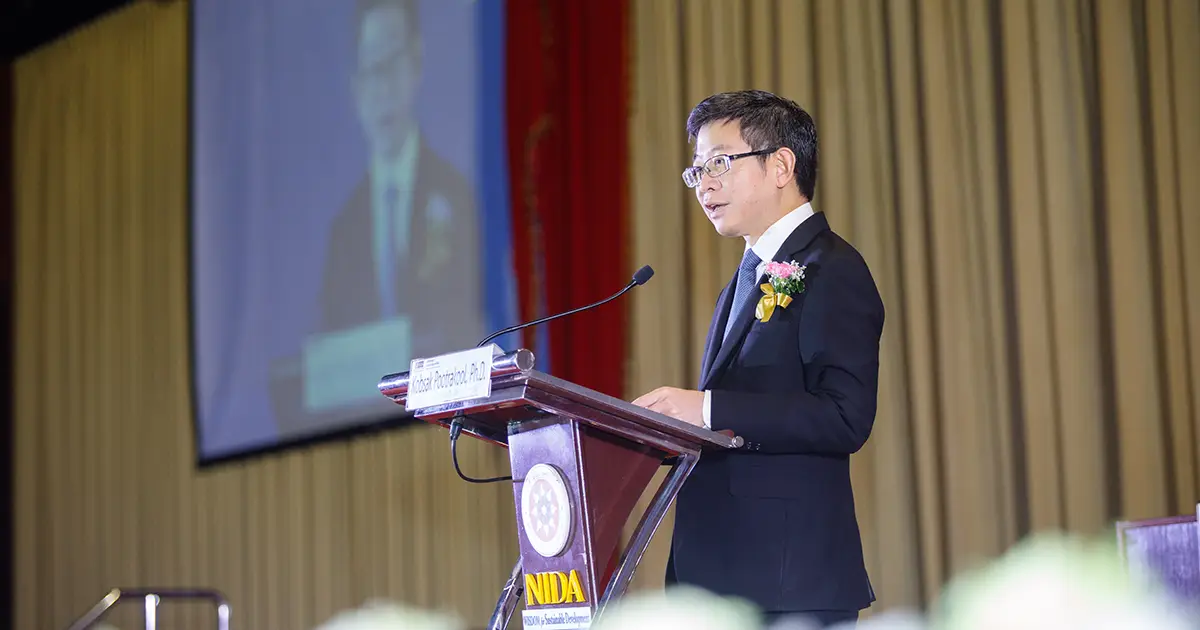By Dr. Kobsak Pootrakool
Director and Senior Executive Vice President, Bangkok Bank Public Company Limited
Summary of keynote highlights by
Assoc. Prof. Patthareeya Lakpetch, Ph.D.
In his keynote at the 4th NIC–NIDA International Conference, Dr. Kobsak Pootrakool challenged conventional economic wisdom by asking whether decades of growth have truly delivered prosperity for all. While global economies have made impressive technological progress, he argued that this progress often conceals deep structural inequalities. “Today’s economic growth is like cosmetics,” he observed. “It beautifies the surface but hides the cracks within.” From Shenzhen’s glittering skyline to Silicon Valley’s technological triumphs, prosperity remains unevenly distributed, and even nations long admired for their success still struggle with poverty and homelessness.
Dr. Kobsak explained that the dominant trickle-down theory—the belief that growth at the top will eventually benefit those at the bottom—has proven illusory. Wealth accumulates among elites, while only a few drops reach the majority. This top-heavy model, he warned, breeds inequality, public discontent, and fiscal fragility. Citing Thailand’s own experience, he noted that although official data show declining poverty rates, much of this improvement depends on government transfers rather than real empowerment. As the population ages, rising welfare costs will place increasing pressure on public finances, threatening long-term sustainability.
To restore balance and resilience, Dr. Kobsak called for a paradigm shift toward growth from the bottom—an economic model rooted in empowerment, participation, and self-reliance. He proposed reforms across four interconnected systems: legal frameworks that enable community participation; education that unlocks creativity; governance that decentralizes power to local levels; and economic structures that promote fair competition and entrepreneurship. Genuine growth, he emphasized, begins when people are free to act as agents of their own development.
He illustrated this principle through examples of grassroots innovation across Thailand. Community banks and welfare funds help villagers manage savings and provide social protection. Urban poor have transformed canal-side slums into clean, organized neighborhoods through community-led housing projects. Local tourism initiatives like Khlong Lat Mayom Floating Market have revitalized economies through creativity and collaboration. Environmental programs such as mangrove restoration, crab banks, and tree banks demonstrate how conservation can coexist with livelihoods—earning income while preserving nature. Each case, he explained, proves that when people have ownership and agency, they can achieve dignity, stability, and sustainability without dependency on the state.
Finally, Dr. Kobsak stressed that inclusive development requires collective effort from all sectors. The private sector can act as a powerful catalyst, as seen in the success of community-based enterprises like Pan Klib Snack and Jeerapan Grilled Chicken, which scaled from local products to national brands through partnerships with large corporations such as PTT and Amazon Café.
He closed with an appeal to rethink development itself: “True economic strength begins not at the top, but at the roots of society. When we unleash people’s potential, we achieve growth that is balanced, sustainable, and deeply human.”
ปาฐกถาพิเศษ “พลังจากฐานราก: การทบทวนแนวคิดการเติบโตทางเศรษฐกิจใหม่”
โดย ดร. กอบศักดิ์ ภูตระกูล
กรรมการและรองกรรมการผู้จัดการใหญ่อาวุโส ธนาคารกรุงเทพ จำกัด (มหาชน)
สรุปโดย รองศาสตราจารย์ ดร.พัทรียา หลักเพ็ชร
ในเวทีปาฐกถางานประชุมนานาชาติ NIC–NIDA ครั้งที่ 4 ดร. กอบศักดิ์ ภูตระกูล ได้ตั้งคำถามต่อแบบจำลองเศรษฐกิจโลกที่ยึดถือกันมายาวนานว่า แท้จริงแล้วได้สร้าง “ความมั่งคั่งที่ทั่วถึง” หรือไม่ แม้โลกจะก้าวหน้าอย่างมหาศาลทางเทคโนโลยีและอุตสาหกรรม แต่ความเจริญดังกล่าวกลับปกปิดความเหลื่อมล้ำที่ลึกลงไปในโครงสร้างทางเศรษฐกิจ “การเติบโตในวันนี้เปรียบเสมือนการใช้เครื่องสำอาง ดูดีภายนอกแต่ซ่อนความไม่สมบูรณ์ไว้ภายใน” ท่านกล่าว ไม่ว่าจะเป็นเมืองเสิ่นเจิ้นหรือซิลิคอนแวลลีย์ ความมั่งคั่งยังไม่กระจายอย่างเท่าเทียม และแม้แต่ประเทศที่มั่งคั่งที่สุดก็ยังมีผู้คนจำนวนมากที่ยากจนหรือไร้บ้าน
ดร. กอบศักดิ์ ได้กล่าวถึง “ทฤษฎีเศรษฐกิจไหลริน” หรือ Trickle-down Theory ซึ่งเชื่อว่าความมั่งคั่งจากชนชั้นบนจะกระจายลงสู่ประชาชนนั้น ในที่สุดไม่เคยเกิดขึ้นจริง เพราะทรัพย์สินส่วนใหญ่กลับคงอยู่ในมือของคนส่วนน้อย แนวคิดเช่นนี้ก่อให้เกิดความเปราะบาง ความไม่พอใจทางสังคม และภาระทางการคลังที่ไม่ยั่งยืน สำหรับประเทศไทย แม้ตัวเลขความยากจนจะลดลง แต่ส่วนใหญ่เกิดจากการอุดหนุนของรัฐ ไม่ใช่เกิดจากการเสริมศักยภาพให้ประชาชนพึ่งพาตนเอง เมื่อสังคมเข้าสู่สังคมสูงวัย ค่าใช้จ่ายด้านสวัสดิการย่อมเพิ่มขึ้นและกระทบต่อเสถียรภาพทางเศรษฐกิจในระยะยาว
ท่านได้เสนอการเปลี่ยนกรอบแนวคิดสู่ “การเติบโตจากฐานราก” ซึ่งเน้นการพัฒนาแบบมีส่วนร่วมและการพึ่งพาตนเอง โดยต้องอาศัยการปฏิรูปใน 4 ระบบหลัก ได้แก่ การปฏิรูปกฎหมายเพื่อเปิดทางให้ประชาชนบริหารจัดการทรัพยากรของตนเอง การศึกษาเพื่อปลดล็อกศักยภาพและความคิดสร้างสรรค์ การกระจายอำนาจเพื่อเสริมผู้นำท้องถิ่น และการปฏิรูปเศรษฐกิจเพื่อขจัดการผูกขาดและส่งเสริมผู้ประกอบการรายใหม่ ท่านเน้นย้ำว่า “ความเจริญที่แท้จริงจะเกิดขึ้นได้ก็ต่อเมื่อประชาชนมีอำนาจในการสร้างการเปลี่ยนแปลงด้วยตนเอง” โดยท่านได้ยกตัวอย่างจากกรณีศึกษาทั่วประเทศที่ยืนยันแนวคิดนี้ได้เป็นอย่างดี ไม่ว่าจะเป็น ธนาคารชุมชนและกองทุนสวัสดิการที่คนในหมู่บ้านร่วมกันออมและดูแลกันเอง โครงการบ้านมั่นคงที่พลิกชุมชนแออัดให้เป็นที่อยู่อาศัยที่น่าอยู่ ตลาดน้ำลัดมะยมที่ชุมชนร่วมกันพัฒนาเป็นแหล่งท่องเที่ยวสร้างรายได้ หรือกิจกรรมฟื้นฟูป่า ชายเลน ธนาคารปู และธนาคารต้นไม้ที่เปลี่ยนการอนุรักษ์ให้เป็นรายได้และเงินออมระยะยาว ทั้งหมดนี้สะท้อนว่า เมื่อชุมชนได้รับอำนาจ พวกเขาจะสามารถสร้างความมั่นคงและศักดิ์ศรีได้โดยไม่ต้องพึ่งพารัฐเพียงฝ่ายเดียว
ท้ายที่สุด ท่านได้กล่าวเพิ่มเติมว่าการพัฒนาอย่างทั่วถึงต้องเกิดจากความร่วมมือของทุกภาคส่วน โดยภาคเอกชนมีบทบาทสำคัญในการเป็นตัวเร่งการเปลี่ยนแปลง ดังเช่น กรณีของ “ขนมปั้นขลิบทอด” และ “ไก่ย่างจีระพันธ์” ที่เติบโตจากสินค้าชุมชนสู่แบรนด์ระดับประเทศ ด้วยความร่วมมือจากบริษัทใหญ่ เช่น บริษัท ปตท. จำกัด ( มหาชน) และคาเฟ่อเมซอน เป็นต้น ดร. กอบศักดิ์ ได้ทิ้งท้ายสรุปแก่นของการพัฒนาที่แท้จริงไว้อย่างชัดเจนว่า “ความแข็งแกร่งทางเศรษฐกิจที่แท้จริงไม่ได้เริ่มจากยอดพีระมิด แต่เริ่มจากรากฐานของสังคม เมื่อเราปลดปล่อยศักยภาพของประชาชน เราจะได้เห็นการเติบโตที่มั่นคง ยั่งยืน และมีความเป็นมนุษย์อย่างแท้จริง”




